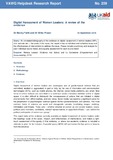Digital Harassment of Women Leaders: A Review of the Evidence
Abstract
Digital harassment of women leaders can encompass acts of gender-based violence that are committed, abetted or aggravated, in part or fully, by the use of information and communication technologies (ICTs), such as mobile phones, the internet, social media platforms, and email. New forms of online violence are committed in a continuum and/or interaction between online or digital
space; it is often difficult to distinguish the consequences of actions that are initiated in digital environments from offline realities, and vice versa. Social media has become a significant arena for the perpetration of psychological violence against women parliamentarians and activists. The most common forms of violence are sexist and misogynistic remarks, humiliating images, mobbing, intimidation and threats. These acts – whether directed at women as civil society leaders, voters, political party members, candidates, elected representatives or appointed officials – can restrict the political participation of women as a group.
This report looks at the evidence currently available on digital harassment of women leaders under the headings ‘scale of the issue’, ‘impact’, and ‘effectiveness of interventions’, and makes a lighttouch assessment of the quality of that evidence, or where non-academic evidence is included a rationale is given for its inclusion. A parallel query (Q210) will summarise the key points or lessons from the evidence.
Overall, there is very limited research directly on digital harassment of women leaders, and none assessing the effectiveness of interventions to address the issue (see table below for further details). Most of the studies were empirical studies with relatively small sample sizes, or desk reviews. Since many of these materials do not fit the criteria for scoring the evidence quality of conventional research materials highlighted in Section 2, a rationale is given for their inclusion.
Citation
Faith, B. and Fraser E. (2018) Digital Harassment of Women Leaders: An Annotated Bibliography, VAWG Helpdesk Research Report No. 209. London, UK: VAWG Helpdesk.Is part of series
VAWG Helpdesk Research Report;209More details
http://www.sddirect.org.uk/media/1630/q-209-digital-harassment-of-women-leaders-bibliography.pdfRights holder
DFIDCollections
- IDS Research [1671]

